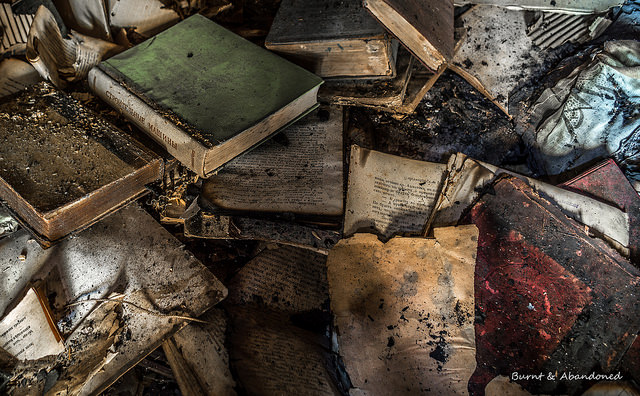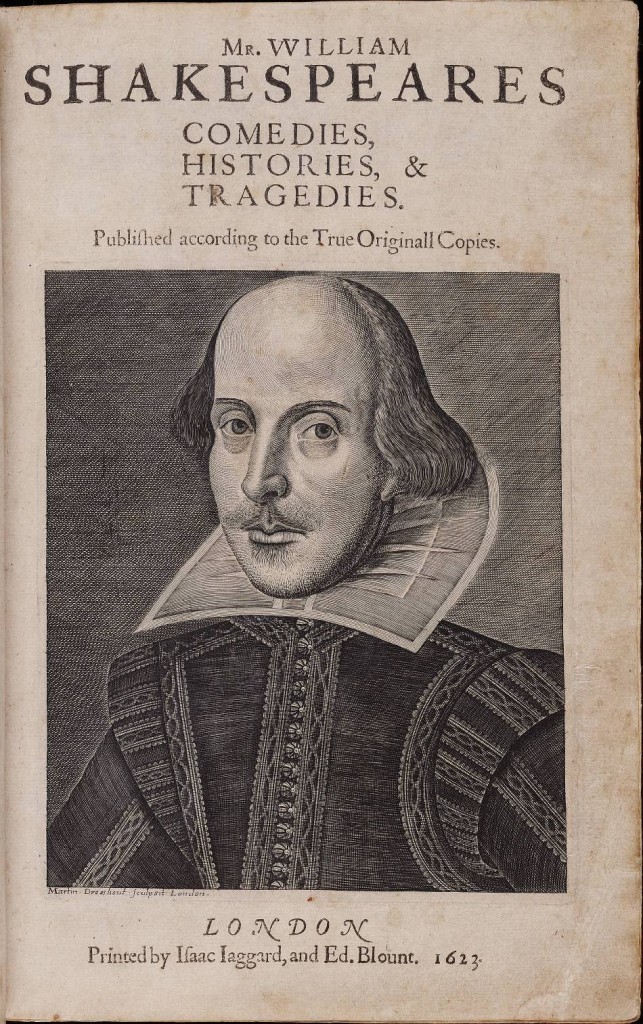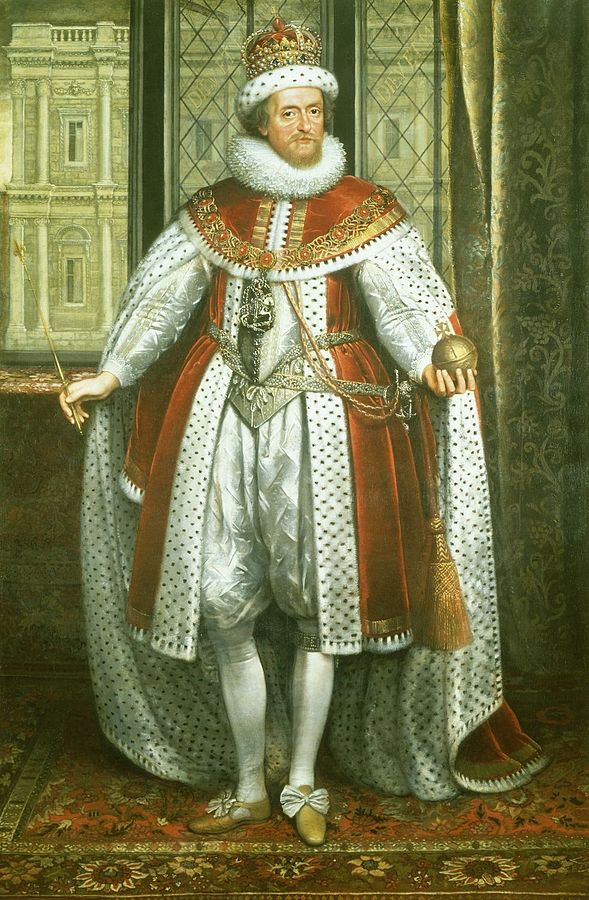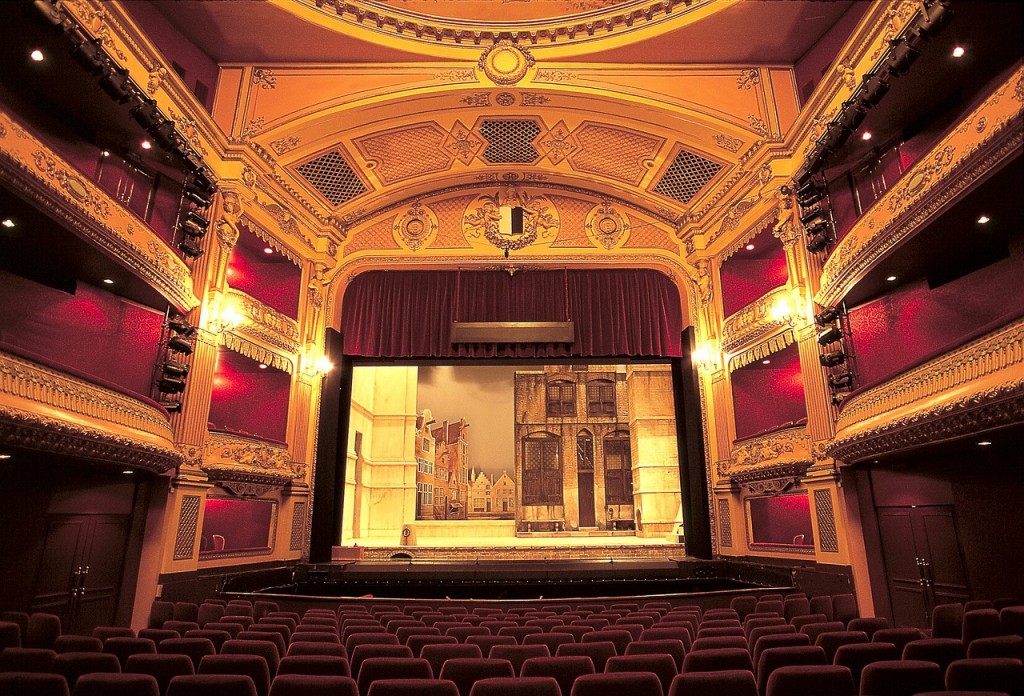
Books Destroyed, Flickr photo shared by darkday, licensed CC BY 2.0
In our seminar group for Arts One this week we puzzled over several things in Shakespeare’s The Tempest, including why Prospero drowns his books at the end. In the play he says he is going to do so:
But this rough magic
I here abjure; and when I have required
Some heavenly music–which even now I do–
To work mine end upon their senses that
This airy charm is for, I’ll break my staff,
Bury it certain fathoms in the earth,
And deeper than did ever plummet sound
I’ll drown my book. (5.1.50, p. 190)
In Peter Greenaway’s film Prospero’s Books we see the books actually being drowned: he and Ariel throw them in the water. Though as an aside, I think it’s Ariel who throws the books in the water except the last two books: Ariel gives The Works of William Shakespeare to Prospero, along with the “missing play” from it, according to the film, which is The Tempest. Then Prospero throws those books away. I think Ariel does all the others, and Prospero does those. I haven’t yet figured out what to make of that (thus it’s an aside).
In this post I want to suggest a couple of interpreations of Prospero giving up his “art,” drowning his books, at the end of the play. Along the way, I’ll also give my ideas about what interpretations we might give to his magic in the first place.
Prospero as Shakespeare, or a playwright generally, or a filmmaker
As one of our seminar members pointed out, Prospero getting rid of his books makes sense if we take him as a representative of Shakespeare himself, and if we take this play as a kind of farewell to the theatre on Shakespeare’s part.

Title Page of the First Folio, 1623, public domain on Wikimedia Commons
And there is good reason why we might think Prospero is Shakespeare: he does act like a playwright, insofar as he puts on a show for others that is a false reality, created through music, actors (the spirits) and what the spirits say (such as in the harpy scene). He also literally puts on a kind of theatre performance in the form of a masque for Ferdinand and Miranda. And his speech right before the bit quoted above about how he’ll give up his “rough magic” certainly sounds like the “magic” could refer to the power of theatre, or of fiction generally:
… I have bedimmed
The noontide sun, called forth the mutinous winds,
And ‘twixt the green sea and the azured vault
Set roaring war; …
. . . . . . . . . . . . . . . . . . . . . . . . . . . . .
… Graves at my command
Have waked their sleepers, oped, and let ’em forth
By my so potent art. … (5.1.41-49, p. 190)
These certainly sound like the sorts of things one can do in fiction, and also in fictional plays of course.
Thus one interpretation of Prospero’s “art” or magic is the power of the playwright to create entire worlds, to make (almost) anything happen as they wish, to create an apparent reality that others might believe to the degree that they allow themselves to be immersed in the play.
Greenaway’s Prospero’s Books takes up this idea as well, interpreting the play in such a way that Prospero is clearly the playwright of the whole story, as well as a character in it. Though of course, as the film is not a theatre production, and doesn’t look like one until the very end (as noted in lecture), we might say that Prospero is a filmmaker, that his magic is the power of filmmaking. (In both of these cases, plays and films, I’m combining the work of the writer and director, the latter being the person who decides what everything is going to look and sound like…so the magic would be that of the person writing and the person directing.)
Why he would give up his books under this interpretation
If we take something like this to be a valid interpretation of Prospero’s magic, and Prospero as, therefore, a playwright like Shakespeare, then it makes sense he would give up his magic at the end. Not only insofar as we think of this play as Shakespeare’s “goodbye,” but also in the sense that the play/film comes to an end. The magic of immersing the audience in a story is ending, the magic of creating a fake reality that we might get lost in and forget ourselves and our reality for some time (remember Gonzalo towards the end saying that Ferdinand found a wife “where he himself was lost,” Prospero found his dukedom in the isle, “and all of us ourselves/ When no man was his own” (5.1. 210, p. 199)). Just as Alonso, Gonzalo, Antonio, Sebastian and the others come to see the “real” reality at the end, after having Prospero’s charms wear off, so the audience of the play/film will soon be emerging from the false reality into the more “real.”
I noticed how in the film Alonso, etc., had cloth over their eyes during the whole film until towards the end, after Prospero has Ariel take off his magic cloak and presents himself “As [he] was sometime Milan” (5.1.86, p. 192). When Prospero has taken off his cloak (or right before it…I can’t remember), Ariel takes off those blindfolds and the nobles can now see the “true” reality. This is also when they are able to speak in their own voices, when they and Ferdinand and Miranda move their lips rather than having Prospero speak for them as during the earlier part of the film. These elements of the film really show well, I think, how Prospero is no longer using his magic to put on a show for them, that they are themselves at this point (including Ferdinand and Miranda, who were being “written” by Prospero earlier).
So I think we can interpret Prospero giving up his books as the ending to the false reality that he has created.
Another way of thinking about Prospero’s art and why he gives it up
As I mentioned in class, we can also add a political element to the power of the playwright/director/filmmaker, given the purpose of court masques at the time. According to an article entitled “Prospero’s Dream: The Tempest and the Court Masque Inverted,” by Jan Frans van Dijkhuizen,
The court masque played a crucial role in the way Renaissance monarchs chose to think about themselves. Masques served essentially as images of the order, peace and harmony brought about by the monarch’s mere presence, and expressed didactic truths about the monarchy. . . . Under James 1, the form of the masque developed into two contrasting parts. The first section, or antimasque, offered an image of vice and disorder, which, in the second section, the masque proper, was superseded by the workings of royal power, and an ordered, harmonious world, with the king at its centre, was established.

James I of England, c. 1620. Public domain on Wikimedia Commons.
The way I understand this is that court masques showed a visual and auditory spectacle of the monarch’s power, and portrayed that power as able to create “an ordered, harmonious world” out of chaos. As van Dijkhuizen goes on to say, “The court masque, then, manifested an important theatrical image of kingship; royalty’s prime mode of expression was fundamentally histrionic,” where “histrionic” means related to theatre, acting, drama–especially insofar as one is overly dramatic, affected, over-playing a part.
I’m thinking, then, that Prospero’s magic could be related to how royal power at the time may have been propped up in part by something like an idealistic image of that power, something portrayed through court masques but also through other trappings of royalty such as rituals and ceremonies, lavish clothes and properties, even extreme exhibitions of power through grisly executions meant to show how great the “ordering” power of the monarch is against “disorder” (this last bit comes from Foucault’s Discipline and Punish, which we’ll read some of later in the year). And this, ultimately, is all show, a fake reality meant to manipulate what the populace thinks of the monarch.
So why would Prospero give this up?
If this makes sense as an interpretation of his magic, why give that up at the end? He is, after all, going back to Milan to rule at least for some time, during which “every third thought shall be [his] grave” (5.1.311, p. 204). Once he has gotten his political power back, wouldn’t this sort of spectacle of power be useful?
There are probably several ways to think about this, but here’s one.
Prospero may be said to realize that there could be problems with focusing too much on providing the “show” of power and not enough on ruling in actuality. He of course found out what happens when you don’t pay attention to the state, when he more or less gave control of Milan to Antonio. But during the play itself he also could be said to realize that putting on a show is not enough. During the masque he has Ariel and the other spirits perform for Ferdinand and Miranda, he suddenly interrupts it and says:
I had forgot that foul conspiracy
Of the beast Caliban and his confederates
Against my life …. (4.1.139-140)
While paying too much attention to the show of power, and trying to convince Ferdinand and Miranda to keep chaste through this masque that counters the disorder of Venus and Cupid trying to entice the two lovers to give into their lust before marriage, Prospero forgets what is actually going on in his “kingdom” on the isle. One can get so lost in the show of power that one fails to pay enough attention to what is necessary to keep it.
We might then connect this to what Professor Crawford said about James I not being a very politically savvy monarch, but someone who loved books and also the theatre. But I don’t know enough about him to take this very far.
As for Prospero, and maybe a Shakespearian comment on royal power, perhaps he gives up his magic because he realizes that the practicalities of ruling are more important than the show of power? Or at least, that focusing too much on the latter can be a dangerous distraction from the former. And further, Prospero then follows this interruption of his masque with his famous speech about how the “vision” he has produced is “baseless,” and so is our lives:
Our revels now are ended. These our actors,
As I foretold you, were all spirits, and
Are melted into air, into thin air,
And, like the baseless fabric of this vision,
The cloud-capped towers, the gorgeous palaces,
The solemn temples, the great globe itself,
Yea, all which it inherit, shall dissolve,
And, like this insubstantial pageant faded,
Leave not a rack behind. We are such stuff
As dreams are made on, and our little life
Is rounded with a sleep. … (4.1.148-158, pp. 180-181)
Prospero seems to realize that there is a problem with “The cloud-capped towers, the gorgeous palaces …” that are part of the trappings of royalty. It is all “baseless,” false, unreal. So perhaps he is ready to give that up?
Still, there’s a problem
But that doesn’t mean we can go from this false reality of the show of power to some more substantial reality, according to this speech. Indeed, everything is in some sense “insubstantial,” destined to “dissolve”; our lives are like dreams.

Public domain from Pixabay
This idea is exhibited elsewhere in the play and film as well. When Prospero gives up his magic and Alonso, Antonio, Sebastian, Gonzalo and the others come back to their senses, the “reality” they then inhabit is still within the play and the film, of course. They emerge out of one false reality into another false reality within the play and the film. So too, when we as audience members leave the theatre, it is not perhaps to some substantial reality that is significantly different from a play or a film.
The fact that the film starts to look more like a filming of a stage play after Prospero gives up his magic (which I hadn’t noticed until Professor Mota pointed it out) also pointed me in this direction. The film is over, but then we are still in a fictional story. At the end of the film, after the Epilogue, the characters applaud as Ariel runs down the stage, towards the camera, and the last image in the film looks like the page of a book that is being written on. Ariel then jumps out of the frame of that book (perhaps being free from the author, Prospero?), but we are left with the page on which writing is still happening.
Ultimately, this complicates the reading I was giving earlier about Prospero giving up his magic because it is insubstantial, baseless, fake, and he wants something more “real” in terms of being a ruler.
But then again, as one of the members of our seminar said in class, he is nearing death after all; so maybe he is just pondering the end of his own life!

Okay, I have been thinking about what you have said here since it was first posted and I really wanted to write a comment on this before everyone forgets that we read The Tempest. But, I am going to be honest and say that I do not find myself to be particularly adept at analyzing and interpreting Shakespeare’s plays; after all, The Tempest is only my second encounter with Shakespeare and his work (go Macbeth for being the first). Also, prior to seeing Prospero’s Books, I had never watched an artistic movie. So, please don’t hesitate to point out any flaws in my interpretation of the text or the movie.
I want to begin by talking about the aside that you brought up in the first paragraph. You said that Ariel was the one who drowned most of Prospero’s books at the end of Peter Greenaway’s film Prospero’s Books. If my memory serves me correctly, in this scene, Prospero hands each book to Ariel, who then proceeds to throw the tome into the water. As you mentioned in the post above, Prospero drowning his books (or, in the movie, Ariel doing most of this for Prospero) is “Prospero giving up his ‘art’”. Regardless of what Prospero’s art is actually representing, it is Prospero’s magic that enables him to become the ruler of the island and all its inhabitants, for, as Caliban points out later in the play, “without [his books] / [Prospero’s] but a sot, as I am, nor hath not / One spirit to command…” (3.2, 90-93). Thus, I believe, that Ariel drowning Prospero’s books at the end of the film is symbolic of Prospero releasing Ariel, and the island itself, from his power. After all, Ariel is handed each book, each small piece of knowledge that allowed Prospero to rule the island, by Prospero himself. Ariel is then able to cast these books, and all of Prospero’s power, away from himself and the island without Prospero doing anything to stop him. Instead, Prospero passively watches as Ariel throws away his books, and all the knowledge and the power that they gave him. In the process of Ariel doing this, the books become waterlogged; they are ruined and rendered useless, preventing Prospero from ever repossessing the power that had previously enabled him to control life upon the island. Thus, by allowing Ariel to destroy the source of Prospero’s power, Greenaway might be trying to illustrate the freedom Ariel and the island’s inhabitants have gained by Prospero leaving the island to become the Duke of Milan.
Once Ariel has destroyed most of the books, Prospero steps forward, gives a bit of a speech, and throws a the works of Shakespeare—and a volume containing Shakespeare’s missing play, The Tempest—into the water. Now, what’s up with that? Why does Prospero choose throw these two books away instead of getting Ariel to do it? In an attempt to answer these questions, I’m going to reiterate what you said in this post by stating that, in Prospero’s Books, Greenaway is depicting Prospero as Shakespeare (or a playwright or filmmaker in general). As you have also pointed out, The Tempest was the last play that Shakespeare composed on his own. With these things in mind, I think that it is possible to state why Greenaway might have chosen to show Prospero drowning the works of Shakespeare in his movie. First off, it is clear that these books are a very significant aspect of Prospero’s life. In the film, Greenaway makes this very clear from the beginning; he decides to make the opening scene be of an image of Prospero writing down a line from the play itself: “Knowing I loved my books, he furnished me / From mine own library with volumes that / I prize above my own dukedom” (1.2 166-168). Prospero, in giving up his books, which he valued above all other things, including his dukedom, is giving up a very important aspect of his life. For, he is not only letting go of his source of power on the island, but he is relinquishing something that defined a large part of who he was. Similarly, Shakespeare, while writing this play, is preparing to give up the theater, which forms a large piece of his identity. So if we take Prospero to be representative of Shakespeare, then it is possible to state that, in drowning the works of Shakespeare, Prospero is drowning himself and the very essence of who he is. So, perhaps, Greenaway is highlighting how Shakespeare might have felt while he was writing this play.
However, as you have said, the problem here is that, after Prospero gives up his magic, the film still seems to be very much like a work of fiction. Maybe Greenaway is trying to depict that, though Shakespeare has finished his solo career as a playwright, he was still involved in the world of fiction. After all, as pointed out in the lecture for The Tempest, Shakespeare, after “retiring” from his theatrical career, did work collaboratively with other poets and participated in plays as an actor. Instead of being the playwright, the single, ultimate power who controlled just about every action on the stage, Shakespeare, in the years leading up to his death, gave up the powers of the playwright to become more like a duke—someone who had power but needed to listen to and obey those above his station. So maybe this is why the movie still seems to be very much like fiction, even after Prospero’s magic is no longer in effect and his role as the playwright is over. However, while writing The Tempest. Shakespeare couldn’t have known what his life was going to be like after he retired from the theater. In spite of this, Shakespeare still makes Prospero sacrifice his magic to become the Duke of Milan in the play. So, there has to be another reason why the characters in The Tempest still seem to be in a “false” reality. I’d also like to think that there is some kind of political interpretation (or some other interpretation beyond the meta-theatrical one) behind all this. Alas, I do not know much about masques in plays or politics of England during Shakespeare’s time; so, I am going to refrain from commenting on this….
However, I do have one more question. In this post, you say that, while watching the movie, you noticed that the gentry have a cloth over their eyes for most of the film. At the end, when Prospero sheds his magic cloak and releases Antonio et al. from his spell, Ariel removes the cloth from the nobles’ eyes, allowing the nobles’ to see the “true” reality. When I watched the movie, I initially thought along the same lines: that the royals were blinded from “reality” by Prospero’s magic and when the spell was removed, they were able to “see” again. But, then I remembered that, earlier on in the film, when Ferdinand makes his first appearance, Ferdinand has a blindfold over his eyes as well. Upon seeing Miranda, Ariel removes the blindfold. However, as far as I can tell, at this point in time, Ferdinand is just as trapped in Prospero’s enchantment as everyone else is. Thus, I am confused. What are these blindfolds supposed to be symbolic of? Is the blindfold over Ferdinand’s eyes representative of something different?